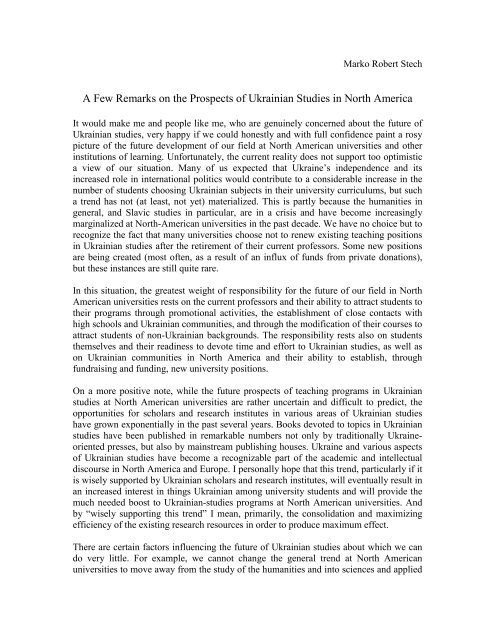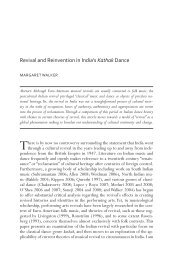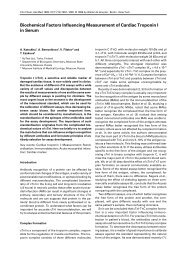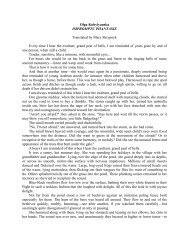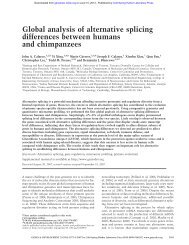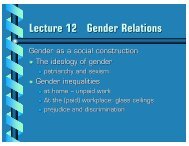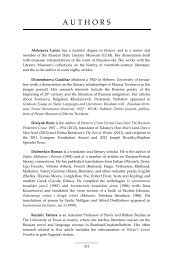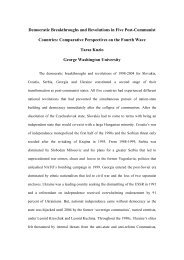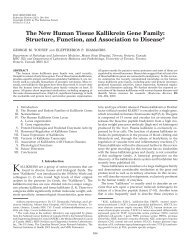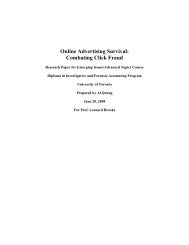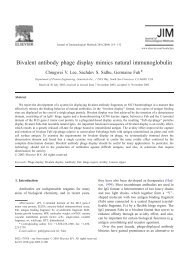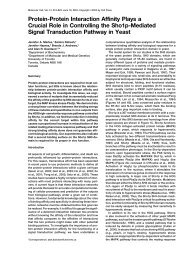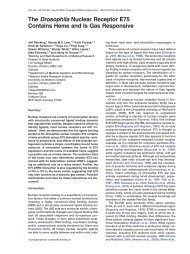Marko Stech - University of Toronto
Marko Stech - University of Toronto
Marko Stech - University of Toronto
You also want an ePaper? Increase the reach of your titles
YUMPU automatically turns print PDFs into web optimized ePapers that Google loves.
<strong>Marko</strong> Robert <strong>Stech</strong><br />
A Few Remarks on the Prospects <strong>of</strong> Ukrainian Studies in North America<br />
It would make me and people like me, who are genuinely concerned about the future <strong>of</strong><br />
Ukrainian studies, very happy if we could honestly and with full confidence paint a rosy<br />
picture <strong>of</strong> the future development <strong>of</strong> our field at North American universities and other<br />
institutions <strong>of</strong> learning. Unfortunately, the current reality does not support too optimistic<br />
a view <strong>of</strong> our situation. Many <strong>of</strong> us expected that Ukraine’s independence and its<br />
increased role in international politics would contribute to a considerable increase in the<br />
number <strong>of</strong> students choosing Ukrainian subjects in their university curriculums, but such<br />
a trend has not (at least, not yet) materialized. This is partly because the humanities in<br />
general, and Slavic studies in particular, are in a crisis and have become increasingly<br />
marginalized at North-American universities in the past decade. We have no choice but to<br />
recognize the fact that many universities choose not to renew existing teaching positions<br />
in Ukrainian studies after the retirement <strong>of</strong> their current pr<strong>of</strong>essors. Some new positions<br />
are being created (most <strong>of</strong>ten, as a result <strong>of</strong> an influx <strong>of</strong> funds from private donations),<br />
but these instances are still quite rare.<br />
In this situation, the greatest weight <strong>of</strong> responsibility for the future <strong>of</strong> our field in North<br />
American universities rests on the current pr<strong>of</strong>essors and their ability to attract students to<br />
their programs through promotional activities, the establishment <strong>of</strong> close contacts with<br />
high schools and Ukrainian communities, and through the modification <strong>of</strong> their courses to<br />
attract students <strong>of</strong> non-Ukrainian backgrounds. The responsibility rests also on students<br />
themselves and their readiness to devote time and effort to Ukrainian studies, as well as<br />
on Ukrainian communities in North America and their ability to establish, through<br />
fundraising and funding, new university positions.<br />
On a more positive note, while the future prospects <strong>of</strong> teaching programs in Ukrainian<br />
studies at North American universities are rather uncertain and difficult to predict, the<br />
opportunities for scholars and research institutes in various areas <strong>of</strong> Ukrainian studies<br />
have grown exponentially in the past several years. Books devoted to topics in Ukrainian<br />
studies have been published in remarkable numbers not only by traditionally Ukraineoriented<br />
presses, but also by mainstream publishing houses. Ukraine and various aspects<br />
<strong>of</strong> Ukrainian studies have become a recognizable part <strong>of</strong> the academic and intellectual<br />
discourse in North America and Europe. I personally hope that this trend, particularly if it<br />
is wisely supported by Ukrainian scholars and research institutes, will eventually result in<br />
an increased interest in things Ukrainian among university students and will provide the<br />
much needed boost to Ukrainian-studies programs at North American universities. And<br />
by “wisely supporting this trend” I mean, primarily, the consolidation and maximizing<br />
efficiency <strong>of</strong> the existing research resources in order to produce maximum effect.<br />
There are certain factors influencing the future <strong>of</strong> Ukrainian studies about which we can<br />
do very little. For example, we cannot change the general trend at North American<br />
universities to move away from the study <strong>of</strong> the humanities and into sciences and applied
sciences; neither can we greatly influence the political situation in Ukraine, which<br />
determines the formation <strong>of</strong> an international image <strong>of</strong> Ukraine and Ukrainians. However,<br />
we can do much to improve the existing situation by focusing our efforts in several key<br />
areas, such as:<br />
1. effective campaigns aimed at promoting Ukrainian studies in Ukrainian communities<br />
in North America in order to recruit new students;<br />
2. increasing fundraising efforts aimed at gaining support for Ukrainian studies and<br />
ensuring that the existing programs continue to exist and grow while new programs are<br />
being created. (This practical and “non-academic” area <strong>of</strong> activity has too <strong>of</strong>ten been<br />
avoided by pr<strong>of</strong>essors in Ukrainian studies at North American universities);<br />
3. active support <strong>of</strong> research that would result in quality academic and non-academic<br />
publications that would further promote Ukrainian studies in North America;<br />
4. focusing on cooperation, i.e., on joint and/or jointly funded projects involving various<br />
Ukrainian-studies programs;<br />
5. the pooling <strong>of</strong> the existing resources and consolidation <strong>of</strong> our efforts by seeking<br />
mutually beneficial ways <strong>of</strong> including scholars and graduate students from universities<br />
with underdeveloped Ukrainian-studies programs and/or working in specialties that are<br />
on the fringe <strong>of</strong>, so to speak, “mainstream Ukrainian studies” in large academic projects<br />
(such as, for example, the Internet Encyclopedia <strong>of</strong> Ukraine) that can serve as forums for<br />
presenting the results <strong>of</strong> their research and showcasing their expertise;<br />
6. an active effort at increasing the “presence” <strong>of</strong> Ukrainian studies on the Internet—an<br />
area that is still ignored and avoided by many Ukrainian-studies specialists;<br />
7. increased efforts at bridging the gap between Ukrainian studies and other academic<br />
fields by working to incorporate Ukrainian topics into studies <strong>of</strong> a broader scope, within<br />
such disciplines as European or East European history, post-colonial studies, gender<br />
studies, etc.<br />
I strongly believe that a considerable improvement <strong>of</strong> the current situation in our field can<br />
be achieved by simply making the existing Ukrainian-studies resources in North America<br />
more efficient, focused, and consolidated; by opening up to other disciplines and fields <strong>of</strong><br />
study; and by accepting the importance <strong>of</strong> such practical and “non-academic” matters as<br />
fundraising, outsourcing, and active promotional efforts.


